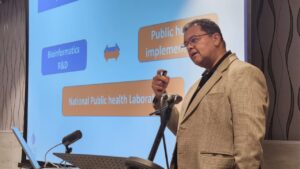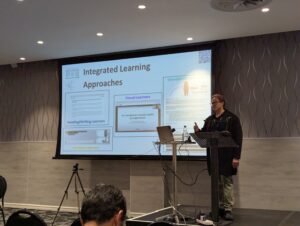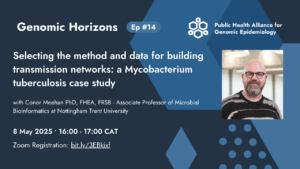
Among the many highlights at ABPHM, the poster flash talk session emerged as a particularly enjoyable and fun-filled experience. In just 60 seconds, participants captivated the audience with their innovative research and findings, highlighting the breadth and depth of topics encompassing microbiology, bioinformatics, and public health. We’ve listed the titles and abstracts of the PHA4GE associated poster presentations.
Mapping the primer scheme landscape with the PHA4GE primer scheme specification
Bede Constantinides, Ilene Karsch-Mizrachi, Zahra Waheed, Finlay Maguire, Emma Griffiths, Jennifer Guthrie, Ruth Timme, Catarina Inês Mendes, Duncan MacCannell, Peter van Heusden
The hope is that these standardized tags will improve communication regarding quality control in public repositories and make datasets of variable quality more easily identifiable. The tags have already been implemented by the FDA’s GenomeTrakr laboratory network for SARS-CoV-2 wastewater surveillance. Suggestions for additional tags can be submitted to PHA4GE via the New Term Request Form in the GitHub repository. Through the implementation of a feedback and suggestions mechanism, we expect the tags to evolve in line with the community’s changing needs.
Using the INSDC Pathogen DOM to better structure genomic data submitted for public health applications
Catarina Inês Mendes, Ruth Timme, Finlay Maguire, Ilene Karsch-Mizrachi, Zahra Waheed, Masanori Arita, Robert Petit III, Duncan MacCannell, Emma Griffiths
We propose the Pathogen DOM be utilised for all pathogen submissions (bacterial, viral, fungal, and parasites), simplifying data submissions across pathogens and providing a transparent data structure for downstream data analysis and dashboard monitoring. The Pathogen DOM, proposed here, will ignite streamlined data submissions, provide an organizing framework for future development within the INSDC, and offer a transparent data structure for downstream queries, data analysis and dashboard monitoring, for all pathogens, submitted and stored within the INSDC.
PHA4GE Guidance for Detecting and Characterizing SARS- CoV-2 Recombinants
Emily A Smith, Sage M. Wright, Kevin G. Libuit, Jamie Southgate
The detection and characterization of SARS-CoV-2 recombinant genomes is a challenge to pathogen genomic surveillance systems worldwide. Many public health labs do not have the bioinformatics capacity and expertise needed to rule out sequence contamination, determine parental lineages, and track the emergence of novel lineages in public repositories. However, recombinants are essential to characterize and monitor because they represent a combination of multiple SARS-CoV-2 lineages, sometimes resulting in a novel combination of mutations that may play a role in transmissibility, immune evasion, and disease severity. To address this challenge, the Public Health Alliance for Genomic Epidemiology (PHA4GE) Bioinformatics Pipelines and Visualizations Working Group has developed a guidance document for identifying and characterizing SARS-CoV-2 recombinant genomes
Integrating Bioinformatics solutions to improve global Public Health : PHA4GE Pipelines and Data Visualization Working Group
Jamie Southgate, Kevin G. Libuit, Gerald Mboowa, Waqasuddin Khan, Gültekin Ünal, Victoria R. Carr, Emily Anne Smith, Samiah Kanwar, Jennifer L. Guthrie, Curtis J. Kapsak, Frank Ambrosio, Guerrino Macori, Wonderful T. Choga, Carlos Flores, Jose M. Lorenzo-Salazar, Amy E. Gaskin, Catie Williams
Current approaches for developing public health Bioinformatics software are highly fragmented, relying primarily on Government platforms and academic software development, frequently to the exclusion of interested participants. The Public Health Alliance for Genomic Epidemiology (PHA4GE) is a community of practitioners from academia, public health bodies and private industry focused on the establishment of an open source, community-supported environment for Bioinformatics software development, installation, validation, and support to promote global public health. The Pipelines and Data Visualization Working Group is housed within PHA4GE and was formed out of concerns that public health Bioinformatics workflows were becoming increasingly complicated. Efforts were needed to promote sensible standardization, interoperability, portability and reproducibility of assays and workflows across a range of environments, contexts and resource conditions.
Running AMR bioinformatic tools using Google Colaboratory
Su Datt Lam, Sabrina Di Gregorio, Mia Yang Ang, Emma Griffiths
Antimicrobial resistance (AMR) is a current, escalating public health issue that has a negative effect globally. Numerous pathogenic microbes are becoming more resistant to available drugs, and the rate of development of new antimicrobials is slowing down. Genomic and metagenomic data are increasingly being used in public health surveillance investigations. To this end, bioinformatics tools have been developed to determine AMR genes and their variants. AMR pathogen genomics surveillance is ideally carried out by public health authorities and clinicians; however, most practitioners lack bioinformatics skills and might have to rely on an external organisation or commercial service providers to complete the analysis. To address this issue, we developed a Google Colaboratory (a Google Notebook that allows code to be launched from a browser) that enables users with limited bioinformatics skills to detect and visualise AMR genes using any computing device. In this current Colaboratory, we used AMRFinderPlus, a popular AMR detection software created by the National Center for Biotechnology Information; nonetheless, AMR detection findings from other programmes, such as ResFinder, can also be included. Using this Colaboratory, AMR detection data from different laboratories can be converted to a standardised output specification (the hAMRonization output) developed by the Public Health Alliance for Genomic Epidemiology (PHA4GE) (https://github.com/pha4ge/hAMRonization).



